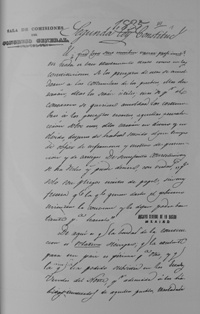The 'Moderating Power' in Latin America: the failure of an alternative constitutional design.
The 'Moderating Power' in Latin America: the failure of a constitutional design alternative.
(El Poder Moderador en América Latina: el fracaso de una alternativa de diseño constitucional)
You can access the complete Spanish version of this dissertation here![]()
 .
. 
Between 1819 and 1836 at least six constitutions, which included some kind of a ‘Moderating Power’ were drafted and adopted in different areas of Latin America. This fact in itself suggests that the theory of the Moderating Power enjoyed a significant popularity in the region during the first years after independence. Nonetheless there had been no works which approached the Latin American experience with said theory from a regional and comparative perspective. More so studies of each of the particular experiences are rare and difficult to access. With this in mind, and building on my previous work on Mexico’s 1836 constitution, I set myself to the task of taking a first step in this direction.
The main hypothesis of my work is that in Latin America the constitutional design solutions offered by the theory of the moderating power were abused. While in Europe this institution had been though of as a mechanisms that would facilitate the balance between constitutional powers and thus the survival of constitutional order, Latin American legislators thought a Moderating Power could not only solve the problems of separation of powers but also the social and political instability which continuously threatened their nations. Because of this, Latin American constitutions often created Moderating Powers which enjoyed certain faculties designed for preserving order during times of crisis. The result was that Latin American Moderating Powers had internally contradictory functions which deprived them of the characteristical neutrality so much emphasised by Benjamin Constant. Under these circumstances it was impossible for these Moderating Powers to consolidate themselves and thus allow for the gradual evolution of those constitutional systems in which they were created.
In the cases I analyse in detail, the neutrality and reliability which Constant’s Moderating Power derived from its inability to directly affect the common citizen, were destroyed by allowing it certain crisis management powers. As a result Latin American Moderating Powers were exposed to the risk of becoming tyrants themselves by constantly exercising powers which went beyond their strict functions, or becoming pointless by allowing constant violations of the constitutional limits they were supposed to protect.
I believe my conclusions help understand the failure of what has usually been termed ‘conservative constitutionalism’ in Latin America. At the same time, they shed some light on how the ‘liberal presidential’ model became the general rule in Latin American constitutionalism. Additionally, the comparison between Latin American experiences and European and North American theory and practice highlight the role played by that region in the broader Atlantic constitutional experience.
